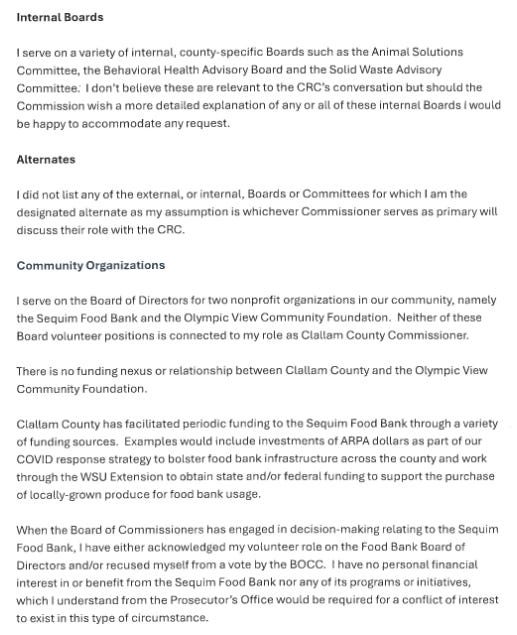Despite overwhelming public support for ethics reform, Clallam County’s Charter Review Commission is again turning to government insiders instead of honoring the will of voters. With 74% of the public backing a proposal to bar commissioners from serving on nonprofit boards that receive county funds, the CRC has stalled action—opting instead to invite those very commissioners to justify their dual roles. The result is a growing credibility gap, as the public asks: who is Clallam County government really serving?
First, it was the Water Steward proposal. Survey data showed that a strong majority of Clallam County residents opposed creating a new department to manage water-related issues. Yet the Clallam County Charter Review Commission (CRC) chose to dismiss the survey results—calling them “flawed” and “only a tool”—and instead turned to the Dungeness River Management Team (DRMT), a government-heavy body that includes county and tribal representatives, to gauge support.
In essence, when the public did not support the CRC’s proposal, the commission asked government stakeholders how they would like to govern.
Now, the same approach is playing out again.
Seventy-four percent of Charter Review survey respondents indicated support for prohibiting county commissioners from serving on non-governmental organization (NGO) boards.
The reasoning behind this proposed amendment is straightforward: when commissioners both approve public funding and sit on the boards of recipient organizations, there can be a perceived—if not actual—conflict of interest.
Leading municipal advisory organizations have long cautioned against such entanglements. The Municipal Research and Services Center (MRSC) notes that holding positions on nonprofit boards that receive public money can result in conflict-of-interest violations and recommends transparency and recusal. The National Association of Counties (NACo) similarly emphasizes that public officials should avoid dual roles that could compromise their impartiality.
The proposed amendment does not seek to restrict civic involvement but to draw a clear ethical boundary. Public officials should not have overlapping roles that could influence or appear to influence financial decisions affecting nonprofit organizations they help govern.
Proposed Charter amendment: No County Commissioner shall serve as a board member, officer, or trustee of any nonprofit organization that receives direct financial compensation, contracts, grants, or in-kind benefits from Clallam County. If a County Commissioner is selected, appointed, or elected to such a position, they must resign from either the nonprofit or their public office within 30 days. Failure to do so constitutes a disqualifying conflict of interest.
Despite strong public support, the CRC has invited county commissioners to present information about their roles on nonprofit boards before considering the proposal. Commissioners Mike French and Randy Johnson are expected to speak at the CRC meeting tonight. Commissioner Ozias will not, but has submitted a letter (read below).
This raises a fair question: why is the CRC again asking government officials for input on a matter where the public has already spoken clearly?
Commissioner Randy Johnson currently serves as president of the Olympic Peninsula YMCA, which has received significant county funding over the years—most notably, a $731,705 Opportunity Fund grant in 2016 and additional support for an early learning center and regional health collaborations.
Commissioner Mark Ozias serves as chair of the North Olympic Development Council (NODC), a regional nonprofit that receives county contracts, including a $369,000 agreement with Cascadia Consulting that Commissioner Ozias initially said he had no knowledge of until brought to light by private citizen, John Worthington. He also serves on the board of the Washington State Association of Counties (WSAC), a lobbying group that has supported statewide tax proposals, such as pay-per-mile taxation and changes to property tax limits. These relationships raise questions about where priorities lie: with constituents or with intergovernmental networks?
“I believe that it would be doing the residents of Clallam County a disservice should their elected Commissioners not be allowed to participate in and support leadership of the State Association [Washington Association of Counties]. We would have less of a voice, less opportunity to advocate for our needs, and less chance to promote causes that are important to our residents.” — First Vice President of Washington Association of Counties, Mark Ozias
Commissioner Ozias has stated that the NODC and the Strait Ecosystem Recovery Network, which it fiscally sponsors, do not set policy but rather inform elected officials about strategies for long-term Puget Sound recovery. However, the NODC’s own public materials indicate it has historically supported policy initiatives and action planning. For instance, in 2007, the NODC helped fund ICLEI membership and greenhouse gas assessment software for several local governments—including Clallam County—which led to the development of formal carbon reduction action plans. The NODC also participated in discussions to implement those plans.
This documented activity raises questions about whether the organization’s role is more policy-influencing than Commissioner Ozias suggests.
Commissioner Mike French is expected to present his own nonprofit affiliations during the meeting.
CRC Commissioner Mark Hodgson, who proposed inviting county commissioners to present their involvement, is not a county commissioner but is currently running unopposed for a seat on the Port Angeles City Council. He also serves as president of Habitat for Humanity of Clallam County, which has partnered with the City of Port Angeles on affordable housing initiatives and home repair programs. While the amendment in question applies to county government, it is reasonable to note that broader conversations around governance standards could eventually influence other jurisdictions.
Participation on certain boards, such as Clallam Transit or the Board of Health, is statutory and appropriate—offering public visibility, records access, and meetings that can be observed by the public. However, involvement in private nonprofit boards that receive county support deserves a higher level of scrutiny. When county commissioners help shape a nonprofit’s priorities, then vote on county budgets or contracts affecting that nonprofit, public trust can be eroded.
Commissioners frequently cite limited time as a reason for reduced public engagement or infrequent town halls. It’s worth considering whether relinquishing some external board roles might allow more opportunities for constituent interaction.
Ultimately, the Charter Review Commission was established to serve as a conduit for citizen input into how local government operates. Repeatedly setting aside survey results in favor of soliciting opinions from those currently in power may send the wrong message: that government, not the people, has the final say in how Clallam County is governed.
Charter Review Commission meeting
Monday, July 14, 5:30 PM
Clallam County Courthouse, Port Angeles, room 160
If you would like to participate in the meeting via Zoom audio only, call 253-215-8782 and use meeting ID: 836 9266 4344 and passcode: 12345 and use *9 to raise your hand. If you would like to participate in the meeting via Zoom video conference, visit https://us06web.zoom.us/j/83692664344 and use meeting ID: 836 9266 4344 and passcode: 12345.
View the agenda here.
Have a comment for the Charter Review Commission? Email the Clerk of the Board at loni.gores@clallamcountywa.gov and specify “CRC.”


























